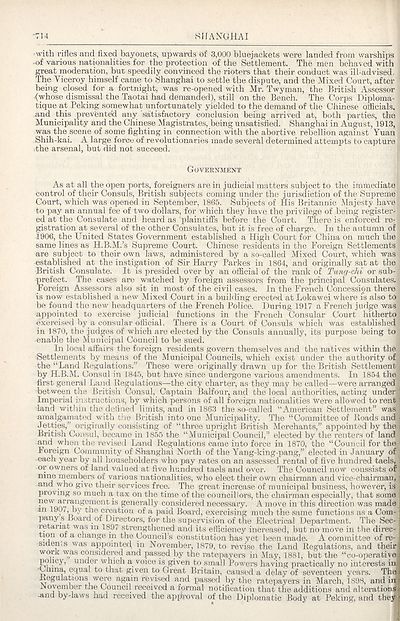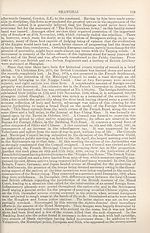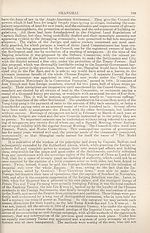1918
(788) Page 714
Download files
Complete book:
Individual page:
Thumbnail gallery: Grid view | List view

■714
SHANGHAI
with rifles and fixed bayonets, upwards of 3,000 bluejackets were landed from warships
-of various nationalities for the protection of the Settlement. The men behaved with
great moderation, but speedily convinced the rioters that their conduct was ill-advised.
The Viceroy himself came to Shanghai to settle the dispute, and the Mixed Court, after
being closed for a fortnight, was re-opened with Mr. Twyman, the British Assessor
{whose dismissal the Taotai had demanded), still on the Bench. The Corps Diploma¬
tique at Peking somewhat unfortunately yielded to the demand of the Chinese officials,
and this prevented any satisfactory conclusion being arrived at, both parties, the
Municipality and the Chinese Magistrates, being unsatisfied. Shanghai in August, 1913,
was the scene of some fighting in connection with the abortive rebellion against Yuan
Shih-kai. A large force of revolutionaries made several determined attempts to capture
the arsenal, but did not succeed.
Government
As at all the open ports, foreigners are in judicial matters subject to the immediate!
control of their Consuls, British subjects coming under the jurisdiction of the Supreme;;
Court, which was opened in September, 1865. Subjects of His Britannic Majesty have
to pay an annual fee of two dollars, for which they have the privilege of being register-;
ed at the Consulate and heard as plaintiflfs before the Court. There is enforced re¬
gistration at several of the other Consulates, but it is free of charge. In the autumn of
1906, the United States Government established a High Court for China on much the
same lines as H.B.M.’s Supreme Court. Chinese residents in the Foreign Settlements
are subject to their own laws, administered by a so-called Mixed Court, which was
established at the instigation of Sir Harry Parkes in 1864, and originally sat at the
British Consulate. It is presided over by an official of the rank of Tung-chi or sub-'
prefect. The cases are watched by foreign assessors from the principal Consulates.I
Foreign Assessors also sit in most of the civil cases. In the French Concession there i
is now established a new Mixed Court in a building erected at Lokawei where is also to
be found the new headquarters of the French Police. During 1917 a French judge was
appointed to exercise judicial functions in the French Consular Court hitherto^
exercised by a consular official. There is a Court of Consuls which was established^
in 1870, the judges of which are elected by the Consuls annually, its purpose being to
enable the Municipal Council to be sued.
In local affairs the foreign residents govern themselves and the natives within the
Settlements by means of the Municipal Councils, which exist under the authority of
the “Land Regulations.” These were originally drawn up for the British Settlement!
by H.B.M. Consul in 1845, but have since undergone various amendments. In 1854 the :
first general Land Regulations—the city charter, as they may be called—were arranged!
between the British Consul, Captain Balfour, and the local authorities, acting underl
Imperial instructions, by which persons of all foreign nationalities were allowed to rent!
land within the defined limits, and in 1863 the so-called “American Settlement” was j
-amalgamated vvith the British into one Municipality. The “Committee of Roads and)
Foreign Community of Shanghai North of the Yang-king-pang,” elected in January of
each year by all householders who pay rates on an assessed rental of five hundred taels,
or owners of land valued at five hundred taels and over. The Council now conssists or
niI{e members of various nationalities, who elect their own chairman and vice-chairman^
and who give their services free. The great increase of municipal business, however, is
proving so much a tax on the time of the councillors, the chairman especially, that some
?e7a^TgTent *s brenerall-y considered necessary. A move in this direction was made
in 1907, by the creation of a paid Board, exercising much the same functions as a Com¬
pany s Board of Directors, for the supervision of the Electrical Department. The Sec¬
retariat was m 1897 strengthened and its efficiency increased, but no move in the direc¬
tion or a change in the Council’s constitution has yet been made. A committee of re-
siden.s was appointed, in November, 1879, to revise the Land Regulations, and their
work was considered and passed by the ratepayers in May, 1881, but the “co-operative,
policy, under which a voice is given to small Powers having practically no interests in
'China, equal to that given to Great Britain, caused a delay of seventeen years. Thai
Regulations were again revised and passed by the ratepayers in March, 1898, and in
November the Council received a formal notification that the additions and alterations
And by-laws had received the approval of the Diplomatic Body at Peking, and thej|
SHANGHAI
with rifles and fixed bayonets, upwards of 3,000 bluejackets were landed from warships
-of various nationalities for the protection of the Settlement. The men behaved with
great moderation, but speedily convinced the rioters that their conduct was ill-advised.
The Viceroy himself came to Shanghai to settle the dispute, and the Mixed Court, after
being closed for a fortnight, was re-opened with Mr. Twyman, the British Assessor
{whose dismissal the Taotai had demanded), still on the Bench. The Corps Diploma¬
tique at Peking somewhat unfortunately yielded to the demand of the Chinese officials,
and this prevented any satisfactory conclusion being arrived at, both parties, the
Municipality and the Chinese Magistrates, being unsatisfied. Shanghai in August, 1913,
was the scene of some fighting in connection with the abortive rebellion against Yuan
Shih-kai. A large force of revolutionaries made several determined attempts to capture
the arsenal, but did not succeed.
Government
As at all the open ports, foreigners are in judicial matters subject to the immediate!
control of their Consuls, British subjects coming under the jurisdiction of the Supreme;;
Court, which was opened in September, 1865. Subjects of His Britannic Majesty have
to pay an annual fee of two dollars, for which they have the privilege of being register-;
ed at the Consulate and heard as plaintiflfs before the Court. There is enforced re¬
gistration at several of the other Consulates, but it is free of charge. In the autumn of
1906, the United States Government established a High Court for China on much the
same lines as H.B.M.’s Supreme Court. Chinese residents in the Foreign Settlements
are subject to their own laws, administered by a so-called Mixed Court, which was
established at the instigation of Sir Harry Parkes in 1864, and originally sat at the
British Consulate. It is presided over by an official of the rank of Tung-chi or sub-'
prefect. The cases are watched by foreign assessors from the principal Consulates.I
Foreign Assessors also sit in most of the civil cases. In the French Concession there i
is now established a new Mixed Court in a building erected at Lokawei where is also to
be found the new headquarters of the French Police. During 1917 a French judge was
appointed to exercise judicial functions in the French Consular Court hitherto^
exercised by a consular official. There is a Court of Consuls which was established^
in 1870, the judges of which are elected by the Consuls annually, its purpose being to
enable the Municipal Council to be sued.
In local affairs the foreign residents govern themselves and the natives within the
Settlements by means of the Municipal Councils, which exist under the authority of
the “Land Regulations.” These were originally drawn up for the British Settlement!
by H.B.M. Consul in 1845, but have since undergone various amendments. In 1854 the :
first general Land Regulations—the city charter, as they may be called—were arranged!
between the British Consul, Captain Balfour, and the local authorities, acting underl
Imperial instructions, by which persons of all foreign nationalities were allowed to rent!
land within the defined limits, and in 1863 the so-called “American Settlement” was j
-amalgamated vvith the British into one Municipality. The “Committee of Roads and)
Foreign Community of Shanghai North of the Yang-king-pang,” elected in January of
each year by all householders who pay rates on an assessed rental of five hundred taels,
or owners of land valued at five hundred taels and over. The Council now conssists or
niI{e members of various nationalities, who elect their own chairman and vice-chairman^
and who give their services free. The great increase of municipal business, however, is
proving so much a tax on the time of the councillors, the chairman especially, that some
?e7a^TgTent *s brenerall-y considered necessary. A move in this direction was made
in 1907, by the creation of a paid Board, exercising much the same functions as a Com¬
pany s Board of Directors, for the supervision of the Electrical Department. The Sec¬
retariat was m 1897 strengthened and its efficiency increased, but no move in the direc¬
tion or a change in the Council’s constitution has yet been made. A committee of re-
siden.s was appointed, in November, 1879, to revise the Land Regulations, and their
work was considered and passed by the ratepayers in May, 1881, but the “co-operative,
policy, under which a voice is given to small Powers having practically no interests in
'China, equal to that given to Great Britain, caused a delay of seventeen years. Thai
Regulations were again revised and passed by the ratepayers in March, 1898, and in
November the Council received a formal notification that the additions and alterations
And by-laws had received the approval of the Diplomatic Body at Peking, and thej|
Set display mode to:
![]() Universal Viewer |
Universal Viewer | ![]() Mirador |
Large image | Transcription
Mirador |
Large image | Transcription
Images and transcriptions on this page, including medium image downloads, may be used under the Creative Commons Attribution 4.0 International Licence unless otherwise stated. ![]()
| Asian directories and chronicles > 1918 > (788) Page 714 |
|---|
| Permanent URL | https://digital.nls.uk/194903574 |
|---|
| Attribution and copyright: |
|
|---|---|
| Description | Volumes from the Asian 'Directory and Chronicle' series covering 1917-1941, but missing 1919 and 1923. Compiled annually from a multiplicity of local sources and research. They provide listings of each country's active corporations, foreign residents and government agencies of all nationalities for that year, together with their addresses. Content includes: various treaties; coverage of conflicts; currencies and taxes; consular fees; weights and measures; public holidays; festivals and traditions. A source of information for both Western states and communities of foreigners living in Asia. Published by Hongkong Daily Press. |
|---|---|
| Shelfmark | H3.86.1303 |
| Additional NLS resources: |

